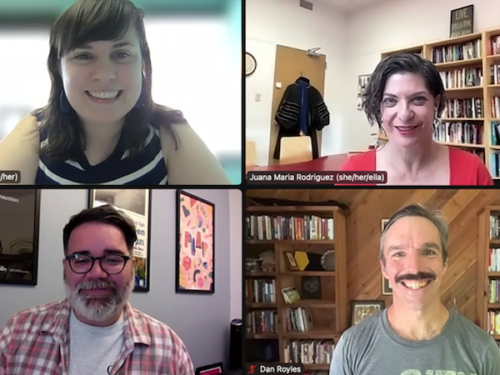As LGBTQ+ individuals around the globe continue to pursue the freedom to express themselves openly, the work to record their histories is as crucial as ever. During Pride Month, Wiki Education’s June Speaker Series panel “Who is preserving LGBTQ+ history?” explored the ongoing documentation work on Wikipedia by LGBTQ+ people, students, scholars, and allies, and how anyone can contribute to the preservation efforts for current and future generations.
“It feels like where theory means practice in a really powerful way for students,” said panelist Dean Allbritton, who teaches with the Wikipedia assignment at Colby College. “[My students] are saying, I’m not just researching or understanding the plight or the lives of LGBTQ people throughout the world, but I’m actually making the invisible feel visible in a way that they feel personally and ethically edified by. And it’s just beautiful.”

The associate professor of Spanish enjoys the pivotal moment where the assignment “clicks” for his students – at the beginning, students often tell Allbritton that they’ve been taught to mistrust information on Wikipedia, but when they understand the need to cite all added content, their perceptions change.
“I just love that moment of discovery for them of what Wikipedia can do, and what it can offer particularly to groups that have been underrepresented throughout history,” emphasized Allbritton, reflecting on the Wikipedia assignment’s role in his course “Queer Spain”. “They learn a different, fact-based style of writing, research skills…and all of this is available through the Wiki Education program, which is incredible.”
Panelist Juana Maria Rodriguez, professor of Ethnic Studies at UC Berkeley, echoed Allbritton’s experience in empowering students to add LGBTQ+ content to Wikipedia as part of their coursework. Students quickly realize they are writing for a global audience and can’t simply jump to analysis without substantive research to support their edits, she explained.
“It actually gives [my students] a sense of the incredible resources they have,” said Rodriguez, noting their access to information held behind paywalls. “That sense of reaching out, speaking to the world, is really impactful for them. Some have taken that extra step to translate pages, coming from their own desire to make this information more widely available.”
The panel also featured the perspective of historian Dan Royles, who traded his usual role of professor to become a student himself in a 2022 Wiki Scholars course focused on enhancing LGBTQ+ histories and content on Wikipedia.
Drawing from his deep expertise and research for his book To Make the Wounded Whole: The African American Struggle for HIV/AIDS, Royles completely transformed the Wikipedia article on American AIDS activist Reggie Williams, expanding the brief text by adding nearly 3,000 words and 20 references.
Royles explained that just like students, he developed an appreciation for the rigor required to significantly improve a Wikipedia article. As part of his edits to Williams’ article, Royles added the names of William’s notable collaborators to encourage future additions on Wikipedia of their own impactful histories.
“The kind of iterative nature of Wikipedia, where our work is the groundwork for the work other people do later, is really valuable,” said Royles.
Margaret Galvan, Speaker Series panelist and assistant professor of Visual Rhetoric at the University of Florida, has taught with Wikipedia for several years, primarily in her course “Queer Comics”.
“Wiki Education’s platform makes it really easy to teach with Wikipedia,” said Galvan. “They have modules where students learn about Wikipedia throughout the semester that you can adapt to your course.”
Galvan encouraged fellow faculty to teach with Wikipedia, underscoring the opportunity to engage students in critical discussions on topics including the idea of notability, particularly when editing content about underrepresented people or subjects.
Catch up on our Speaker Series on YouTube, including “Who is preserving LGBTQ+ history?”, and explore recaps of our most recent programs on our blog:
Interested in incorporating a Wikipedia assignment into your course? Visit teach.wikiedu.org to learn more about the free resources, digital tools, and staff support that Wiki Education provides to instructors in the United States and Canada.
